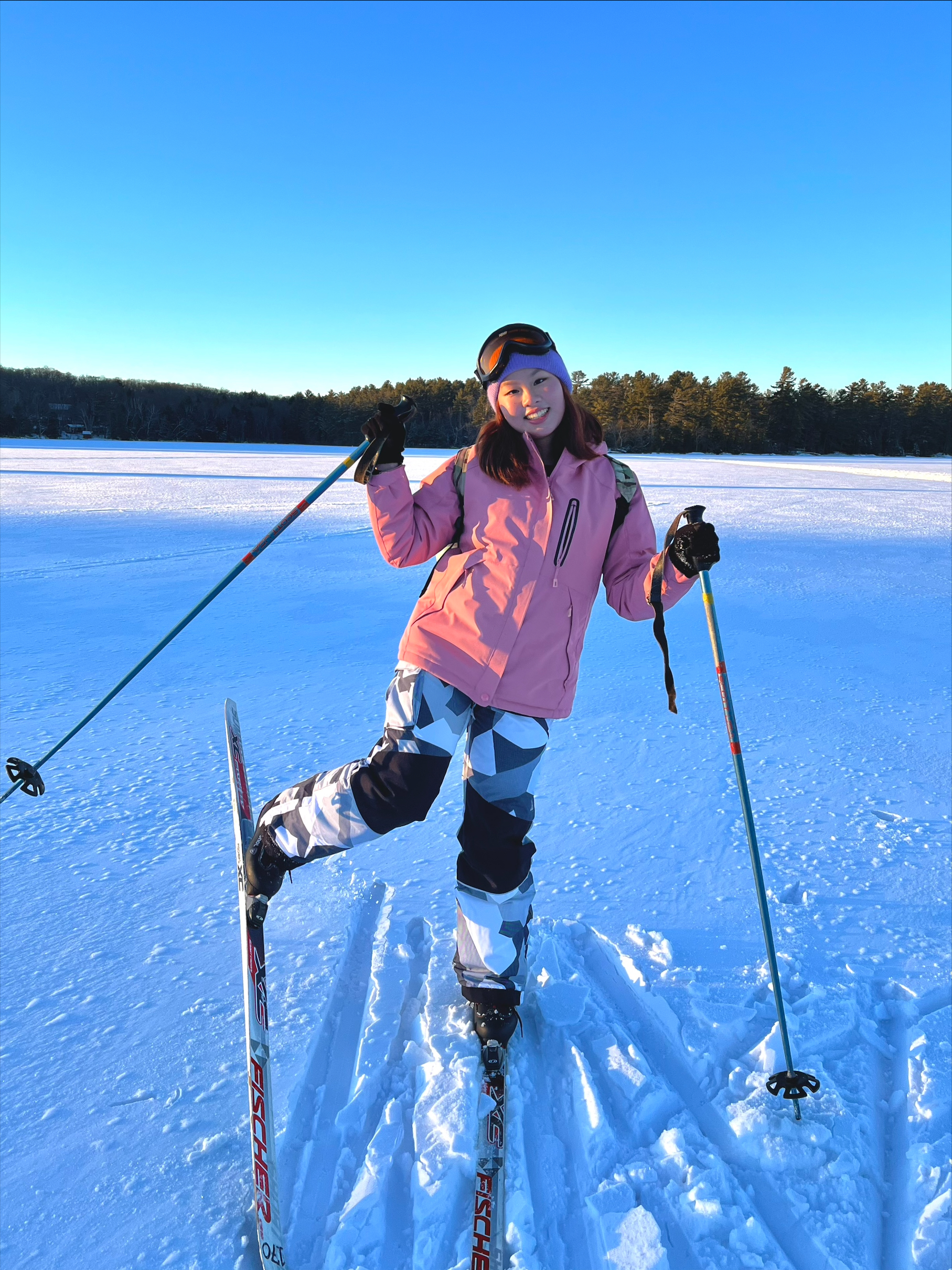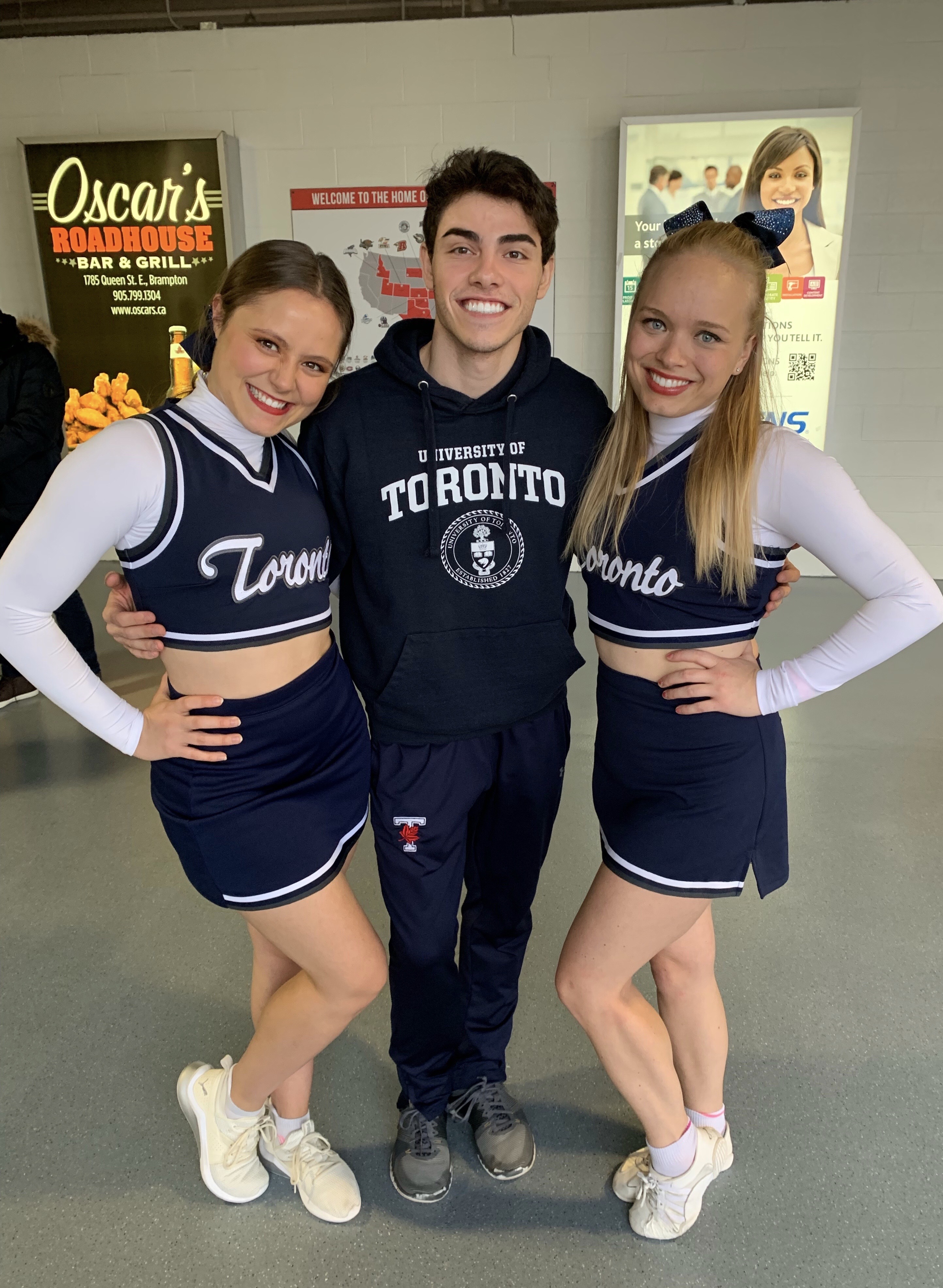Starting June 1, more than 12,700 students graduating from the University of Toronto (U of T) this spring are expected to cross the stage at Convocation Hall to receive their degrees. Among them will be Mandy Wang and Andrei Uzumtoma, two newly minted graduates of the Faculty of Kinesiology and Physical Education (KPE) undergraduate program.
We caught up with them recently to ask them about their student experience at KPE, greatest highlights, lessons learned and plans for the future.
 Mandy Wang knew she wanted to study kinesiology going into grade 12 because she wanted to learn more about the human body. In grade 10, she had gone to a summer camp at a medical school in Taiwan, where she was exposed to human cadaver labs and this helped strengthen her interest in learning about the body in greater depth.
Mandy Wang knew she wanted to study kinesiology going into grade 12 because she wanted to learn more about the human body. In grade 10, she had gone to a summer camp at a medical school in Taiwan, where she was exposed to human cadaver labs and this helped strengthen her interest in learning about the body in greater depth.
She was admitted into the Faculty of Kinesiology and Physical Education at the University of Toronto and decided to accept the offer after attending an information session.
“I experienced genuine care from the KPE student ambassadors and saw how close-knit the faculty was,” says Wang, who came to KPE from a STEM specialized program in high school with a tight-knit group of students and teachers. “I knew a program like KPE would help me thrive and make meaningful connections.”
On top of the KPE community, she was drawn to the program by what she describes as the specificity and diversity of the required courses in the first and second year.
“Taking specialized courses in first year gave me an extra year to strengthen my understanding of kinesiology topics and better realize which aspects of kinesiology I’m interested in for my senior year,” she says.
Two of her favourite courses were Positive Psychology Coaching taught by Associate Professor Ashley Stirling and Legal Aspects of Sports, Recreation and Kinesiology taught by Marcus Mazzucco, a sessional instructor at the faculty.
“Both instructors were constantly taking in our feedback and adapting their courses bit by bit,” says Wang. “It made the learning experience more interactive, which is the best way I learn.”
She also has fond memories of being an orientation week event coordinator in her final year, winter camping as part of the KPE Outdoor Project, and MC-ing the in-person Career Café, where KPE alumni share their career trajectories with current students.
But that wasn’t the only thing that kept Wang busy. She plays the piano and enjoys composing pop ballads. For much of her undergraduate studies, she volunteered for Musical Minds Community Outreach (MMCO), a student-driven volunteer organization at U of T’s St. George campus, giving free piano lessons to underprivileged youth. And that’s not all.
“For one of my final projects in my Illness & Disease in Physical Culture class, we were encouraged by Professor Michael Atkinson to use an artistic form to represent our experiences with COVID-19,” says Wang. “My partner and I created an artistic experience by producing a song (the Shape of Voices) on the keyboard to pair with the imagery of our digital art piece (Phantasmic Reality).”
Her biggest takeaway after four years of in-person and online learning is “to seek, develop and maintain meaningful relationships with others” - from students and faculty members to staff and club members.
“Keeping good connections with people has provided me a lot of opportunities I wouldn’t have had otherwise,” she says. “Being open to try new things, but knowing when to say no is also important in order to balance your workload with mental health.”
Wang’s biggest challenge was time management, especially during first year.
“I was living off campus and trying to adjust to living on my own while maintaining good academic standing and joining extracurricular activities,” she says.
What helped her stay on track was keeping a schedule of all her daily tasks in an agenda.
“I’d check off the tasks I completed, and I’d know which ones I need to prioritize or complete the following day.”
Come September, Wang will be going to the Canadian Memorial Chiropractic College (CMCC). She developed an interest in becoming a chiropractor after a placement opportunity in her third year, which allowed her to shadow a chiropractor at a multidisciplinary clinic.
“This experience allowed me to witness the day-to-day practice of a chiropractor, while gaining some hands-on experience such as assisting with writing soap notes and interacting with patients,” says Wang. “These interactions made me realize how much I enjoy building and maintaining connections with patients, and the holistic and evidence-based approach chiropractors use to help patients improve their health.”
Her advice for students coming up behind her at KPE is to not be afraid to reach out to others.
“Also, don’t be too hard on yourself,” she says. “You’re already really impressive for being accepted into the program. It takes time to transition from high school to university and you’re not the only one feeling this way.”

Growing up, Andrei Uzumtoma was always interested in the intersections between science and sport. He also represented the U of T Junior Blues competitive men’s gymnastics program across Canada from the age of 10.
“The pieces were all there,” he says. “Coming to the U of T kinesiology program just made sense.”
While he retired from gymnastics in grade 12, he was still able to pursue his interest in the sport while studying at U of T.
“I was lucky enough to tumble and compete for the U of T Varsity Cheer team and work as a Junior Blues gymnastics coach,” he says.
Uzumtoma is passionate about advocating for disability sport and equity, and considers the experiences he’s had with both to be one of the highlights of his time at KPE. In his last two years, he was the co-event director, alongside his best friend Mara, for the U of T chapter of motionball, a national non-profit raising funds and awareness for Special Olympics through integrated social and sporting events. Their committee raised $13,500.
“Motionball brings athletes with intellectual disabilities and U of T students together for a chance to participate in sport tournaments featuring non-traditional/adapted sports such as Kinball, benchball, and cornhole,” he says. “It taught me that sport has the power to act as a vessel to celebrate our differences, rather than stifle the characteristics that set us apart.”
This is a lesson Uzumtoma plans to carry with him after graduation.
“One’s differences are what sets them apart,” he says, “and one’s friendships with the people who love and uplift them are one’s most prized possessions.”
Reflecting on the last four years, Uzumtoma says the first semester of first year was a huge learning curve.
“My marks suffered as I attempted to balance a job, Varsity Cheer, living away from home, studying and a social life,” he says.
By second year, he’d figured out a way to manage his time by creating a weekly to-do list.
“Putting in five minutes at the beginning of the week can save you five hours of wasted time procrastinating and stressing,” he says.
His advice for students following in his footsteps is to always ask questions if they’re unsure about something and to get involved. In second year, he ran for athletic commissioner on the KPE student body with his best friend Amy. They were elected as co-commissioners and got the chance to organize intramurals and host a wide array of athletic events, including motionball.
“I felt empowered by how I could positively contribute to creating a fun and inclusive social atmosphere in our faculty,” says Uzumtoma. “I learned that your experience in university is dictated by what you put into it. There’s a myriad of opportunities and resources in KPE at your disposal – you just have to seek them out.”
Uzumtoma plans to apply to law school in the fall, inspired by the KPE courses he took on sport policy and sport law with Assistant Professor Adam Ali, who has since accepted a teaching position at Western University, and Mazzucco.
“I became fascinated with the World Anti-Doping Agency and the role of sport lawyers in the Olympic Movement,” he says.
